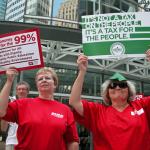The Economic Crisis: Sources
Gar Alperovitz, America Beyond Capitalism: Reclaiming Our Wealth, Our
Liberty, and Our Democracy. (2005)
John Wiley and Sons
Barofsky, Neil, Bailout: An Inside Account of How Washington Abandoned
Main Street While Rescuing Wall Street. ( 2012)
Baker, Dean. Plunder and Blunder: The Rise and
Fall of the Bubble Economy, (2009)
Barlett, Donald L., and Steele, James B., The Betrayal of the American
Dream. (2012).
Black, William, The Best Way to Rob a Bank is to Own One.
Bivens, Josh, Failure by
Design, The Story Behind America’s Broken Economy. 2011.
Campbell, Duane. Choosing
Democracy: a practical guide to multicultural education. (2010)
Center for Popular Economics, Economics for the 99%. July 2012.
Edelman, Peter, So Rich, So
Poor. Why it’s so hard to End Poverty in America. 2012.
Engler, Mark. How to Rule the World: The coming battle over the Global
Economy. (2008)
Ferguson, Charles H. , Predator Nation; Corporate Criminals, Political
Corruption, and the Hijacking of America. 2012. The background for Inside Job.
Frank, Thomas, Pity the
Billionaire: The Hard Times Swindle and the Unlikely Comeback of the
Right. Metropolitan Books. (2012.)
Friedman, Thomas & Michael Mandelbaum, That Used to be US : How
American Fell Behind in the World and How We Can Come Back. 2011.
Fox, Justin. The Myth of the Rational Market: a History
of Risk, Reward, and Delusion on Wall Street. (2009)
Faux, Jeff. The Global Class
War: How America’s Bipartisan Elite Lost Our Future- and What It Will Take to
Win It Back. ( 2006)
Johnson, Simon and James Kwak, 13 Bankers : The Wall Street Takeover and the next
Financial Meltdown. 2010.
Galbraith, John K. The
Predator State. 2008.
Harvey, David. The Enigma of Capital and the Crisis of Capitalism. (2010)
Hedges, Chris, & Sacco, Joe,
Days of Destruction: Days of Revolt. (2012)
Henry, James. The Price of Off Shore Revisited. Tax Justice Network. July 2012.
Krugman, Paul. The Return
of Depression Economics and the Crisis of 2008. (2009)
Krugman, Paul, End this Depression Now. 2012.
Kuttner, Robert. A
Presidency in Peril: The Inside Story of Obama’s Promise, Wall Street’s Power,
and the struggle to control our economic future. 2010.
Levison, Andrew, The White Working Class Today: Who They Are, How They
Think, and How Progressives Can Regain Their Support. 2013.
Lewis, Michael, The Big
Short: Inside the Doomsday Machine. 2010.
McChesney, Robert W. , Digital Disconnect: How Capitalism Is Turning the
Internet Against Democracy. (2013)
Miner, Barbara, Lessons from the Heartland: A Turbulent Half-Century
of Public Education in an Iconic American City. (2013.)
National Commission on the Causes of the Financial Crisis. The Financial Crisis Inquiry Report.
2011.
Prins,Nomi. It Takes a Pillage: Behind the Bailouts,
Bonuses and Backroom Deals from Washington to Wall Street. (2009)
Smith, Yves, Econed: How
Unenlightened Self Interest Undermined Democracy and Corrupted Capitalism. 2010.
Stiglitz. Joseph. Free
Fall, America, Free markets, and the Shrinking World Economy. (2010)
Some on line resources on the economy,
Baseline Scenario. http://baselinescenario.com
Chicago Political Economy Group. www.cpegonline.org
Naked Capitalism. http://www.nakedcapitalism.com
New Deal. www.newdeal20.org
To calculate the benefits that the rich in your state
received from the Obama/Republican compromise. Citizens for Tax Justice.
http://www.ctj.org/
New Economic Perspectives. http://neweconomicperspectives.org

